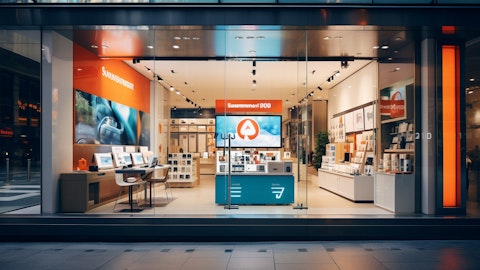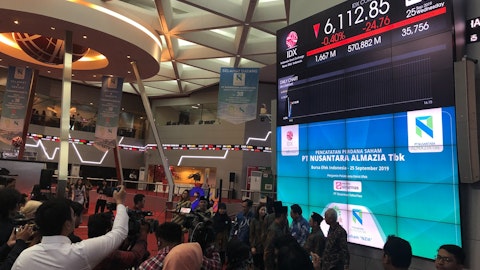In fact, lots of customers are U.S. customers. So we certainly attach importance to the U.S. market. And we will evaluate whether we will be increasing our investment in the U.S. on the basis I described, looking at the value that we can bring the innovation that we can bring. And of course, in that process, we will also take into consider the various risks that you’ve outlined.
Toby Xu: I will take on the second question. Basically, you’re asking how we are going to arrange the financing for AIDC to get sufficient funding for its investments. So generally, as actually Joe was explaining previously, AIDC is going to do financing. However, we are not rushed to do a financing. So really depending on the market conditions, we will find the right moment to do a financing. So before that moment is coming, actually, what we will be doing is, as I said, we have sufficient offshore cash. We can use those cash to finance business — finance the sort of growth of our business as offshore.
Rob Lin: Thank you. Next question.
Operator: Your next question comes from Thomas Chong with Jefferies. Please go ahead.
Thomas Chong: I have a question on the Cloud side. Given Eddie is now needing TTG and Cloud, what should we expect in terms of the synergies in coming quarters? And should we expect AI to be a driver to CML? And on that front, given we have a very good margin profile in the December quarter, any color about the long-term margin assumption that we should expect?
Eddie Wu: Thank you. And that’s a really great question. Certainly, I see very strong potential for greater synergy between Alibaba Cloud and the Taobao Tmall Group, especially driven by AI. As you know, we’ve developing our own large language model called Tongyi Qianwen. And we’re currently testing ways to leverage this model to leverage the AI capabilities to enhance search and to enhance advertising as well. This initiative is still in the early testing phase, but we see very strong potential to leverage AI to significantly enhance search conversion and add monetization. So as I say, that’s still in early testing, but we see excellent potential there.
Rob Lin: Next question, please.
Operator: Your next question comes from Ellie Jiang with Macquarie. Please go ahead.
Ellie Jiang: I just have a follow-up question on the AIDC International unit. The management earlier shared some exciting developments in the overseas market. But it seems like this quarter, the international unit basically saw a very big widened loss to around RMB3 billion, so just wondering, how do we anticipate the investment pace onwards considering certain of the key kind of growing markets such as AliExpress Choice, the hybrid model as well as the Trendyol seems to be still in the very early development stage. So going forward, how do we really evaluate the economics as well as the competitive landscape?
Toby Xu: Well, the loss in AIDC business this quarter really came from three different areas. The first is that the new model, the AliExpress Choice model has grown very rapidly and now account for a very significant percentage of the business overall. At the same time, it’s an early-stage business still being developed. It’s a business that has very strong scale effects. So our priority is to invest in scaling up the business and where the business has achieved scale, then as it grows, the loss will narrow and the business will become profitable. The second thing that contributed to the losses this quarter was significant spending on marketing and some major promotions that we did. And thirdly, some investments that we made in the Middle East and other key markets.
Going forward, I think that we’ll continue to be making large investments in this business, in particular, around Choice. We see very clearly that Choice is delivering a better user experience and resulting in much better user retention than the previous model. So over a longer period of time, we’re certain that Choice will produce very positive investment returns. But the priority right now, the number one priority is to continue to invest scaling up the business.
Rob Lin: Next question, final question.
Operator: Your next question comes from Jialong Shi with Nomura. Please go ahead.
Jialong Shi: So a couple of quick questions for management, if I may. First of all, I’m wondering if you could respond to a recent media report saying that the Alibaba Group would be considering selling Alimama, if you could respond to that, please? Second question has to do with AIDC, can you tell us how big Lazada’s business is in Southeast Asia and the impact that you’ve seen in Indonesia from the team up between TikTok and its local partner.
Toby Xu: This is Toby. I’ll take that first question. I don’t think there’s any need for us to make further comment because we’ve already addressed that rumor and have stated that that’s not true. As far as Alibaba is concerned, Alimama a very important asset for us hyper local segment.
Eddie Wu: Thank you. Well, Southeast Asia continues to be a very important market for us, and there remains significant potential for us to deepen our penetration in Southeast Asia. Our approach is to continue to balance efficiency against growth to continue to work to narrow the losses in the business while maintaining growth So going forward, our strategy will be to continue to make investments at an appropriate scale to grow in Southeast Asia. As far as the restrictions imposed by the Indonesian authorities, the impact on us is relatively limited because we always abide by regulatory requirements.
Rob Lin: Hello, everyone. Thank you for joining today’s earnings call. That concludes our earnings for today. Please reach out to us if you have any questions, and we’ll see you next quarter. Thank you.
Operator: That does conclude our conference for today. Thank you for participating. You may now disconnect.
Follow Alibaba Group Holding Limited (NYSE:BABA)
Follow Alibaba Group Holding Limited (NYSE:BABA)
Receive real-time insider trading and news alerts





